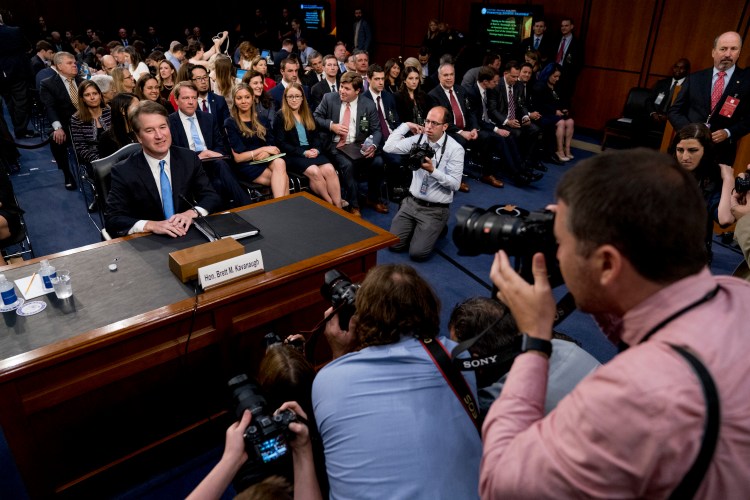‘It is high time that we stopped thinking politically as Republicans and Democrats … and started thinking patriotically as Americans.” With these words, spoken on the U.S. Senate floor as part of her “Declaration of Conscience,” Sen. Margaret Chase Smith in 1950 changed the course of American history. As the first member of Congress to speak against the anti-communist crusade of fellow Republican Sen. Joseph McCarthy, Sen. Smith, and the six fellow Republican senators who endorsed the declaration, showed us what America can be at our very best.
Now we face another crisis of confidence in our democracy, no less severe. And once again, a small group of senators, even a single brave one, could lead us out of the darkness, in a way that no one seems to be discussing.
The combatants in the current Supreme Court confirmation process are missing the forest for the trees. Both of the Senate’s current options – accept or reject the president’s nominee on a simple majority vote – will widen our nation’s partisan divide. But a third option could have the opposite effect and begin rebuilding the public’s trust in both the Senate and the Supreme Court. What is that path? It is the restoration of the 60-senator threshold to confirm a Supreme Court justice. And a single Republican senator might be all it takes to achieve this.
That the Supreme Court confirmation process is broken should be obvious to all, and both parties share a portion of the blame: the Democrats, for eliminating the 60-senator threshold for executive branch and federal judicial confirmations in 2013, and the Republicans, for eliminating that same threshold for Supreme Court confirmations in 2017.
Each party won its respective battle, but the Senate, and the nation, lost the war. The 60-senator threshold had worked. It gave both the majority and minority parties a voice. It required finding some degree of common ground. The new no-holds-barred Supreme Court confirmation process, with only a simple Senate majority needed for confirmation, may serve whichever party is in power at the time, but it does a disservice to our democracy and the American people.
But, hiding in plain sight is a way to restore the 60-senator threshold. All that is needed is one Republican senator with the courage to say: “Enough is enough. It doesn’t matter which party broke this proces – it is time that we restore the 60-senator threshold, and to do so, I am pledging to oppose any Supreme Court nominee lacking the support of 60 senators.” With the Senate’s current 51-49 Republican-Democratic split, just one Republican senator could conceivably restore the 60-senator requirement with this pledge.
The roots of today’s crisis go all the way back to the framers. Because political parties did not exist when the Constitution was drafted, the framers envisioned a Senate – and a Supreme Court – composed of independent “free thinkers.” But the rise of political parties has increasingly turned our most cherished democratic institutions into two opposing camps, and judicial nominees are viewed mostly as proxies for the partisan platform of the president nominating them.
So, like Diogenes searching for an honest man, the nation awaits one honorable senator to break this cycle of partisan retribution and retaliation. Two current Republican senators – Susan Collins and Lindsey Graham – have shown such leadership before, as members of a bipartisan group of senators – dubbed the “Gang of 14” – who banded together to maintain the 60-senator threshold for judicial confirmations in 2005.
But the burden of leadership should not rest solely on a single Republican. Is there a Democratic senator who will step forward also? A bipartisan “Gang of Two (or more)”? By jointly declaring their commitment to uphold the 60-senator Supreme Court threshold for as long as they are in office, these senators would breathe new fire into the legacy of Margaret Chase Smith.
By the time Sen. Smith had concluded her Senate floor speech in 1950, she had changed the course of American history. As one commentator said: “By one act of political courage, (Smith has) justified a lifetime in politics.”
Members of the Senate, what will be your “one act of political courage”? Will you heed Sen. Smith’s call to “start thinking patriotically as Americans”? What will your conscience declare?
A nation awaits your answers.
Send questions/comments to the editors.



Success. Please wait for the page to reload. If the page does not reload within 5 seconds, please refresh the page.
Enter your email and password to access comments.
Hi, to comment on stories you must . This profile is in addition to your subscription and website login.
Already have a commenting profile? .
Invalid username/password.
Please check your email to confirm and complete your registration.
Only subscribers are eligible to post comments. Please subscribe or login first for digital access. Here’s why.
Use the form below to reset your password. When you've submitted your account email, we will send an email with a reset code.